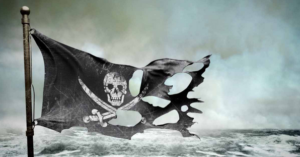In the world of pirates, where lawlessness is often the image that comes to mind, a surprising system of governance existed beneath the black flag. Pirates may have lacked a singular written code, but each crew crafted its own “Articles of Agreement.” The Articles governed every aspect of pirate life, from division of plunder to compensation for the wounded. For pirates, “No prey, no pay” was the rule – they were paid based on their spoils. Captains earned the lion’s share, while roles like Carpenter, Sailing Master, and Surgeon were compensated more generously. Sometimes, pirates received pay in goods, such as silk or slaves.
This pirate society even had a rudimentary healthcare system, compensating those injured in service. Rewards were given for spotting a prize, boarding an enemy, and other acts of valor. Plundering rules were common, with punishment for keeping loot for personal gain. Governance and discipline, mostly guided by unwritten customs like the “Custom of the Coast” and “Jamaica Discipline,” were sometimes outlined in the articles. Interactions with the opposite sex were forbidden, and duels onshore, arbitrated by the Quartermaster, settled disputes. Fighting on the ship was strictly prohibited. The pirate world, far from the lawlessness it’s often portrayed as, was governed by its own intricate system of rules and traditions.
Aliens are out there but they probably don’t care about us
Source: Ancient Origins
Ask me anything
Explore related questions





